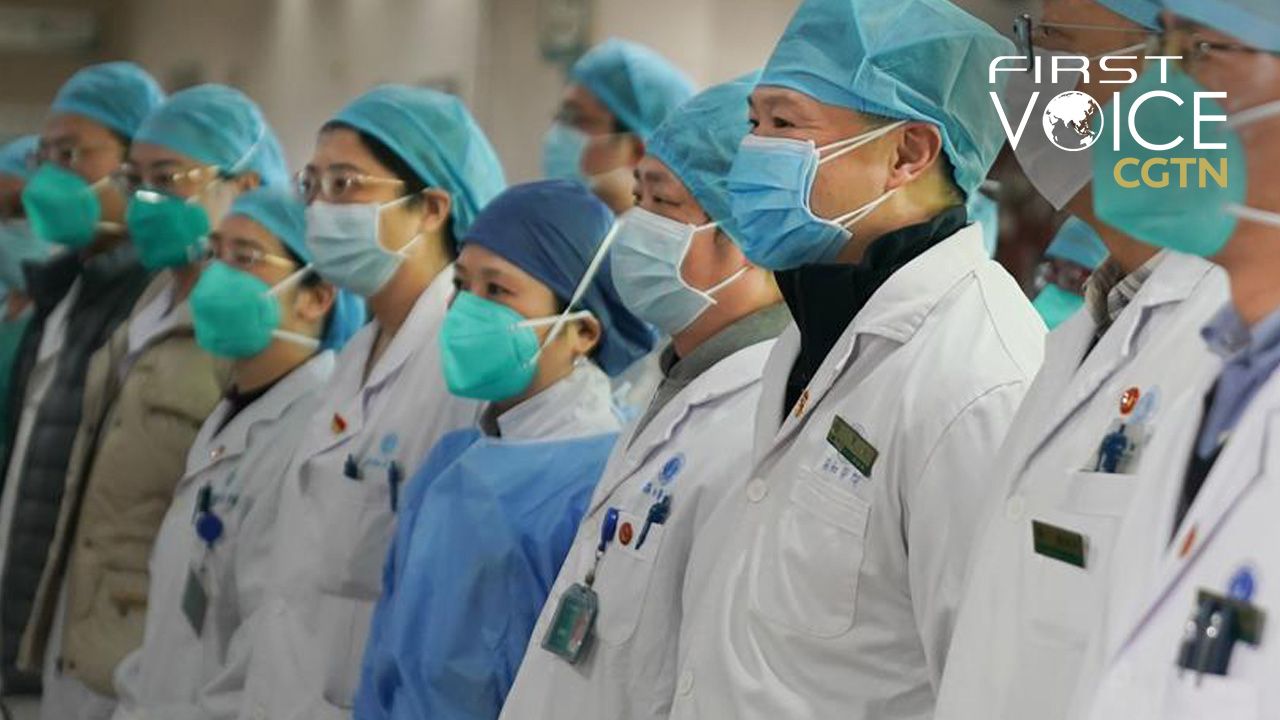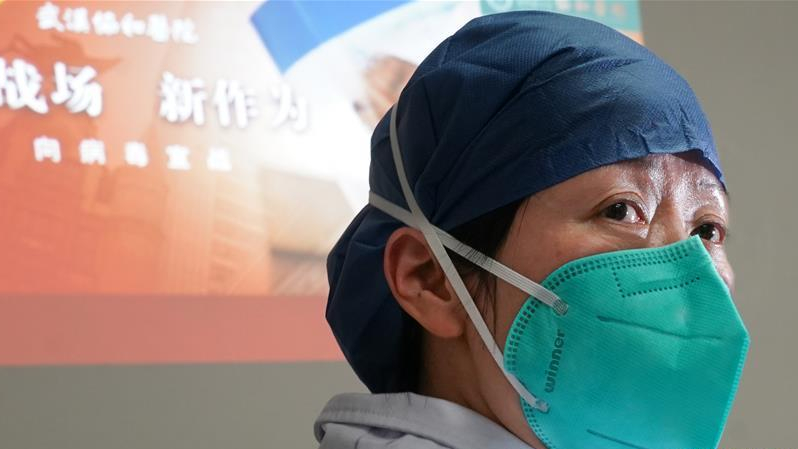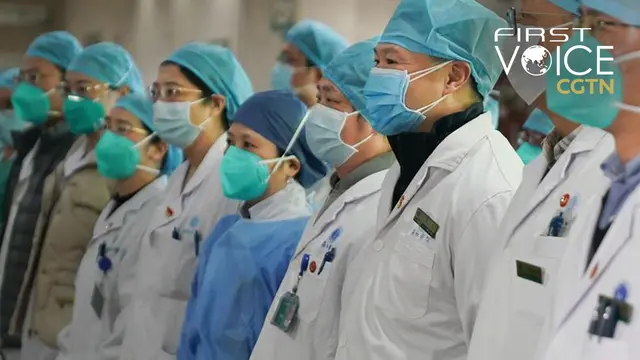
Medical staff of Union Hospital affiliated to Tongji Medical College of Huazhong University of Science and Technology, Wuhan, central China's Hubei Province, January 22, 2020. /Xinhua Photo
**Editor's note: **CGTN's First Voice provides instant commentary on breaking stories. The daily column clarifies emerging issues and better defines the news agenda, offering a Chinese perspective on the latest global events.
There is no doubt that Chinese people's memory of the 2020 Lunar New Year will be dominated by a nationwide anxiety over the outbreak of the Wuhan coronavirus. Since late December last year when a string of infection cases were first discovered in the Chinese central city of Wuhan, the coronavirus has claimed 17 lives in the country with over 600 confirmed cases of infection.
As the death toll climbed quickly, the past four days have witnessed a noticeable surge of public awareness over the disease with Chinese media outlets frequently sending out alerts and updates about the latest developments.
There have also been heated discussions over the situation on Chinese social media platforms. While some believe the epidemic is in general under control and applaud the quick action the government has taken, doubts over the exact number of infected people and a potential cover-up by the government are also very much present.
On Thursday – the day when the city of Wuhan started to be officially sealed off - Chinese media
Caixin
published an interview with Guan Yi, a medical expert from the University of Hong Kong. Taking many by surprise, Guan claimed that the epidemic is happening on a scale far beyond the official acknowledgement. He expressed pessimism over the effectiveness of implementing a quarantine in Wuhan now as "a significant number of people have already left Wuhan for the new year holiday," which could foresee a larger scale of infection in the coming weeks.
However, soon after the article gained traction online, questions have been raised over Guan's credibility as some point out he was not consistent in his comments and had previously said on January 15 that the Wuhan virus would be brought under control and there was no need to panic over it.
This example is an illustration of the confusion that can be felt by the public at a time of national emergency. At this particular moment, the media can be used to inform the public and guide them through the crisis but it also has the potential of exacerbating fears and distrusts among the public.
This is not to say the words of critics like Guan cannot be trusted – in fact they should be listened to and taken seriously – but the authenticity of Guan's opinion is beyond the scope of this article. The point here is – at a time of crisis, the public could be facing an incredible information load that could produce and dizzying effect due to its level of complexity and contradiction.
It is extremely important for individuals to be cautious over what they read online and not trust easily. While governments in general do try to avoid appearing guilty amid public incidents, a portion of the public also has a tendency to always doubt the government's response and suspect it is playing down threats to avoid criticisms. And this could be a weak point that ends up being played upon to inflame public feelings, but not to alleviate the situation.

Zhou Qiong, a doctor in the department of respiratory medicine at Union Hospital affiliated to Tongji Medical College of Huazhong University of Science and Technology, is a member of the "assault team" in the fight against the novel coronavirus outbreak in Wuhan, central China's Hubei Province, January 22, 2020. /Xinhua Photo
At the same time, on the government's side, a robust response is also one of the key elements to get the country through the crisis.
Back in 2002 and 2003 when China was grappling with the SARS epidemic, the government was widely criticized for its slow response and initial reluctance to fully disclose the information.
However, many would point out the SARS incident has prompted a "revolution" in the Chinese government's dealings with public health incidents. It has realized that "transparency has a vital impact on whether a crisis is properly handled," in the words of the then spokesman of the Ministry of Public Health.
For example, since the 2003 SARS outbreak, Beijing has established a nationwide information system for disease control and prevention which hooks up hospitals and clinics across the country and reports outbreaks in real time.
What it learned in the SARS outbreak has enabled the relative progress in its handling of the Wuhan coronavirus. It is widely acknowledged that the Chinese government has acted much more swiftly this time compared to the SARS outbreak.
It is certainly an encouraging thing that Chinese media is now giving real-time updates about infected cases and sending travel alerts. Thursday, details about victims that died of the disease were shared by the authorities. China's National Health Commission also published a third edition of the Wuhan coronavirus diagnosis and treatment plan. The transparency in revealing this information ensures the public has a good knowledge of the situation and will be taking precautionary measures to minimize risks.
Meanwhile, to discourage people's movement across the country, the government has canceled cancellation charges for train tickets. As the situation continues to develop, these proactive measures should certainly continue.
However, despite all the efforts, it would still be far too early to judge the overall performance of the government this time. But one thing is certain, whether it's the 2003 SARS epidemic, the 2008 ice storms that paralyzed China's southern provinces or the Wenchuan earthquake, it is of paramount importance that the government should respond to public crises in a robust manner and it should learn from its past mistakes to enhance its capability to cope with similar events in the future.
(CGTN)
 简体中文
简体中文

